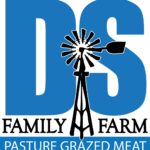Worried about what you are "really" eating? Have peace of mind with pasture grazed meats.
Resting Degraded Land
In a earlier post we pointed out that much of our pastures are in a Degraded State. This is just a fact, most of the agricultural lands of the United States have been “mined” for over 100 years, grasslands included. The first step in fixing a problem is to admit you have a problem. In the 2010 air photo below, we point out some areas that have been “rested” from cropping and grazing for over 25 years. Did “resting” the land help?

Obviously just leaving the land alone is not a solution to our problem. Taking some insights from other regenerative ag folks, we decided to try to bring these “dead” areas back to life. It was obvious that erosion and earlier dirt work in the area had totally stripped the original top soil. Much of the soil surface in this area had “chalk” or limy rocks with very little grass growing.
Our recipe for healing some of this degraded area:
- Bring in carbon (hay)
- Add animal impact (the herd)

Since the site is still in the Conservation Reserve Program, we can only graze the site every other year and pay to graze. Obviously there is not much grazing value here, but we want to add animal impact to start the healing process.

The hay attracts the cattle to the area, otherwise the herd would only briefly walk by. As the herd stays in the area, hay is spread and stomped into the bare soil. The hoof of a 1000 pound cow fractures and breaks up the crusted bare soil. The cattle also add their pee and poop. Everything needed to regenerate a degraded land site.
Fast Forward 2018
In the photo below we have circled the area where hay was placed in 2016. There are very dark green “weeds” growing in this previously dead area. Some of the weeds are over waist-high compared to the very short grass around the rest of the area. Weeds are natures “band-aids”! They arrive to help “heal”. Our cows like to eat most of the “weeds” that grow here on the farm. Weeds are nutrient dense, bringing nutrients from deep under the soil surface. Weeds, natures way to recycle lost nutrients back to the soil surface.

Did I mention that our cattle like to graze weeds?

The above photo was taken shortly after the herd was given access to this part of the pasture. You can see we still have plenty of bare ground between short grass in much of the area, but the system seems to be working. Over the next month we will add some round bales and bring the cows back through for a second graze and hay stomping party.
So, are cows bad for the environment? Cattle just do what cattle do. It comes down to how cattle are managed. We enjoy grazing cattle in the pattern that nature has given us. Graze fresh grass (and weeds) and move! With a little luck and the magic of animal impact, when the herd returns, the grass is better than the last time they visited!




